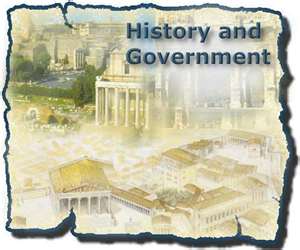 Most of you have probably never heard of this form of government and yet I’d be willing to wager that you’ve either complained about how the United States is becoming more like this or at least argued against someone who made that claim. Plutocracy is rule by the wealthy.
Most of you have probably never heard of this form of government and yet I’d be willing to wager that you’ve either complained about how the United States is becoming more like this or at least argued against someone who made that claim. Plutocracy is rule by the wealthy.
The ancient Roman Republic which was in some ways the model of the modern U.S. was a Plutocracy as the ruling Senate was largely made up of wealthy people who were the only ones eligible for the position. In the U.S. this is not true and the Founding Fathers saw the danger in such a system creating our current bicameral chambers in which the House of Representatives is elected by direct vote. The Senate of the U.S. was originally an appointed position but that has changed. See my blog on this subject for further information. To be fair the original system only allowed land owning white males to vote which was essentially rule by the upper class.
In the U.S. the wealthy have always been allowed raise money and support particular candidates but bribery itself is illegal. However, in recent years and particularly thanks to a recent Supreme Court decision that money is now flowing in ever greater quantities to candidates.
My father told me years ago that it shouldn’t be illegal to give to one candidate in a campaign but when you give to both sides it is nothing other than bribery. My father tends towards the hyperbole in these situation but I must admit that I agree with him on this one. The other issue is that groups of people, be they unions, Political Action Committees, corporate entities, or some other assembly are now allowed to raise money and donate it to a campaign of their particular interest. The upshot of this is that a group can target a campaign where one candidate is vulnerable.
For example, I can start a PAC, raise money from donations from all over the world, and then put that money into a campaign in Idaho. I’m from Missouri and have no representative stake in an election in Idaho. This influx of money to support a particular candidate occurs even before the general election with the primaries in which the candidate from one of the two major parties must bow before the powers of that party in order to get the funds necessary to be elected. Elected officials who do not vote as ordered find themselves without funds in the next election cycle.
This has a chilling effect on that candidate’s votes once elected. They are financially and emotionally obligated to the people who paid for their election. Bribery, in short.
This isn’t exactly new and prior to the 17th Amendment Senators were so obligated to the state legislatures rather than to moneyed influences.
In this series so far I’ve mainly just described government types without commenting particularly but I’ll break that trend today to offer what I consider to be some reasonable solutions to the untoward influence money is bringing to campaigns. I think that politicians who are honorable and want to make their district, country and world a better place would welcome the removal of moneyed influence so they can simply vote their ideological position.
I’m of the opinion that individuals should be allowed to contribute any amount desired to a campaign in which they have a representative interest. I’m from District 3 in Missouri so I can donate to that campaign for the House of Representatives, to a Senator from my state’s campaign or to a presidential candidate. I should not be able to donate to any other campaign or to both candidates in any race. Likewise no group of people should be allowed to collect money to donate to any campaign. If someone wants to give three million dollars to a candidate then so be it. But groups are out and donations to a particular party’s “war chest” are forbidden.
Also, I think all election cycles should be limited in time. The House of Representatives get thirty days to run their primary and the same for the general campaign. The Senate should revert back to state legislature appointment although if not limit them to forty-five days. The presidential campaign should be a three month primary season and a three month general election. No campaigning of any kind should be allowed otherwise.
It’s a fairly extreme solution and might face some constitutional questions. It does give some advantage to incumbents whose names are already known but they have an advantage under any system.
Tell me what you think in the comments below and share away!
Tom Liberman
Sword and Sorcery fantasy with a Libertarian Twist

Your suggestions about how to curtail the influence of money in political contests are excellent. And definitely campaigns should be much shorter. I’m not in agreement with having state legislatures appoint Senators because I think it can lead to the perpetuation of power dynasties.
Thanks for the comment, mom! Perhaps a blog on dynastic power in the US before and after the 17th Amendment would be in order to explore your idea.
Pingback: None of the Above – Nevada « tomliberman